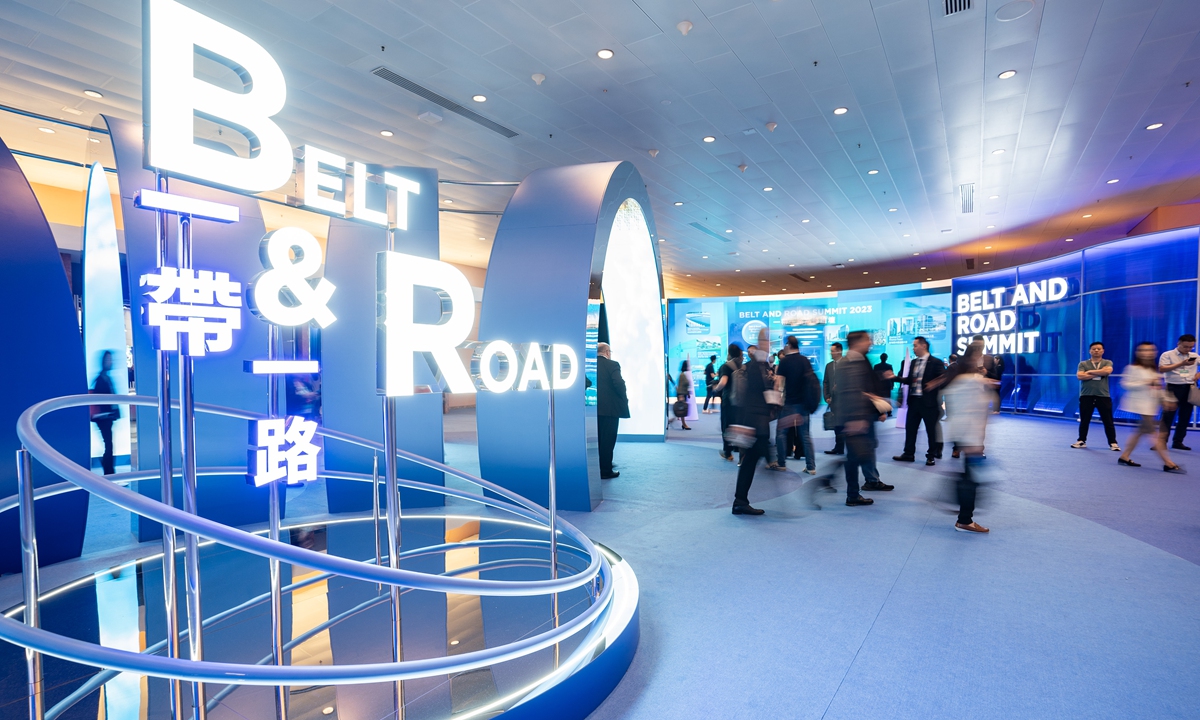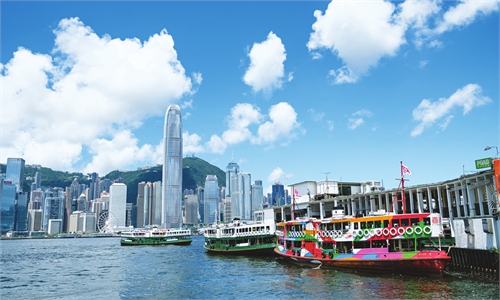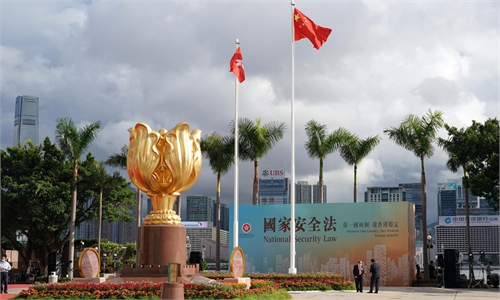Unprecedented attendance to Belt and Road summit shows ‘Hong Kong back on the world’s center stage’
Eyeing closer partnerships with Middle East and ASEAN, HK plays as super connector for the mainland in BRI

Visitors seen at the 8th Belt and Road Summit 2023 in Hong Kong Special Administrative Region, China on September 13. The summit attracted nearly 6,000 government officials, business leaders, entrepreneurs and start-up representatives from nearly 70 countries and regions. Photo: IC
With nearly 6,000 attendees and over 100 overseas and mainland delegations to the 8th Belt and Road summit in Hong Kong, Hong Kong is back on the world stage, eyeing closer partnerships with regions including the Middle East and Southeast Asia as the year also marks the 10th anniversary of the Belt and Road Initiative (BRI). Such unprecedented gatherings and sharing of opportunities also defy the US-led containment and suppression against China's special administrative region (SAR), in addition to its smears on the BRI, observers said.Hong Kong is a participant, contributor and beneficiary of the BRI. The city, which serves as an important conduit between the Chinese mainland and the world, is expanding cooperation with BRI partners in a wide range of areas including trade and investment, innovation and technology, and infrastructure development, said John Lee, Chief Executive of the HKSAR, at the opening of the summit.
"The summit has attracted nearly 6,000 government officials, business leaders, entrepreneurs and start-ups from some 70 countries and regions along the BRI. More than 100 overseas and mainland delegations are here," Lee said, noting that there were a lot of MOUs signed compared to any previous Belt and Road summit.
"These record-breaking numbers are clear and compelling confirmation that Hong Kong has returned to the world's center stage," he said.
Although Hong Kong stepped out of the social turmoil in 2019 and survived the COVID pandemic over the past three years, it has been facing the US-led containment and its continuing hostility on the global stage, especially when it comes to topics such as the National Security Law for Hong Kong and the human rights. For instance, the US has decided it will bar Lee, who is under US sanction list, from attending APEC summit in the US later this year, and it has also been constantly smearing the Chinese city's international image, accusing it of freedom "erosion."
"Given the hostility of the US-led West, Hong Kong needs to expand its international space to freely maneuver. The city has to actively participate in the BRI and forge stronger ties with the countries involved in the BRI," Lau Siu-kai, a member of the Chief Executive Policy Unit Expert Group, told the Global Times on Wednesday.
As a financial, services, trade, information, legal settlement, and shipping hub, Hong Kong can play a crucial role in furthering BRI's development by integrating the nations participating in the BRI, Lau said.
"With the steadfast support of the central government, Hong Kong's status as a hub in the BRI will be enhanced, and that is the reason why Hong Kong is still able to win recognition worldwide notwithstanding hostility from the US-led West," he added.
New opportunities
Amid unprecedented challenges like growing geopolitical tensions and sluggish global economic growth, the summit will contribute to Hong Kong's post-COVID-19 recovery by exploring BRI and other emerging markets, and further cement the city's status as an international financial center, Ken Wong, director of Hong Kong-based All Times Healthy Co who attended the summit, told the Global Times on Wednesday.
Wong said Hong Kong is expected to expand economic and trade cooperation with countries from regions including the ASEAN, Central Asia and Middle East.
Thanks to the central government's strong support and the "One Country, Two Systems'' policy, as well as the city's unique advantages including free trade and professional services, Hong Kong is set to attract more international investment and play a larger role in connecting the Chinese mainland and international markets, Wong said.
The summit set up a special session on the new investment in the Middle East, a session on financial cooperation and on youth development for the first time, with the aim of focusing on exploring new opportunities in the region and pushing forward the BRI financial service cooperation and people-to-people exchange.
"Hong Kong currently enjoys an excellent opportunity to further explore the market in Arab nations," Liang Haiming, dean of Hainan University Belt and Road Research Institute, told the Global Times on Wednesday.
Historically, most Arab countries relied on the US for security and economic aid, which influenced their political orientations and developmental paths. However, in the last three to four years, the US' focus and influence on the Arab world have been diminishing, resulting in notably strengthened relations between countries like Saudi Arabia and China, Liang said.
On the backdrop of this changing situation, China's influence in Arab countries is on the rise, with increased cooperation in trade, finance and energy sectors. And for Hong Kong, further tapping into the Arab market can enhance its export trade and help it to explore new avenues for its financial and emerging industrial development, he said.
The Middle East has become a major focus of attracting business and investment in recent years. As the global financial hub, Hong Kong can not only provide world-class services for the region but also help it develop shipping and air transport, Jacky Ko Chung-kit, vice chairman of the local youth organization Y.Elites Association who also attended the summit, told the Global Times on Wednesday.
"Also, it has the special significance to set up a special session on the youth, which is related to the future of the BRI development," Ko said, noting that the youth in Hong Kong enjoys the language advantages with international perspectives, which are considered as competitive edges in the BRI projects.
Firm support
The central government supports Hong Kong in maintaining its unique status and advantages, consolidating its position as an international center for finance, shipping, and trade, upholding a free and open business environment based on standard practices, preserving the common law system, and expanding smooth and convenient international connections, enabling it to play an even more vital role in the BRI, Ding Xuexiang, China's Vice Premier, said at the summit via video.
"We hope that Hong Kong will deepen regional cooperation, expand its trade network, and engage in closer interactions and collaborations with the rest of the world," Ding said.
Those expectations raised by the central government's official showed that Hong Kong is expected to better cooperate with the country in the BRI development and to enhance the connections with the countries and regions along the route, and the central government hopes to expand its space through Hong Kong's active participation in the initiative to offset Western pressure, Lau said.
Some senior officials also noted that the US should not criticize or interfere in the BRI as the initiative has brought development opportunities to the whole world.
The US, despite expressing dissatisfaction about the BRI, had still benefited from the historical maritime silk road that had started more than two centuries ago, Zheng Yanxiong, head of the central government's liaison office in Hong Kong, told the summit on Wednesday.
"After 240 years, even though the US has surpassed China in many aspects, it is still a beneficiary of the BRI. Its industrial and supply chains have been further secured due to China. China has provided popular, affordable and quality consumer goods. Many enterprises also rely on China's market to survive," Zheng was quoted as saying in media reports.




